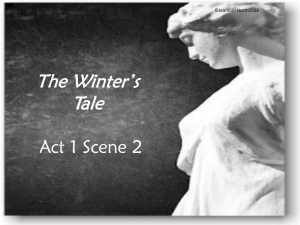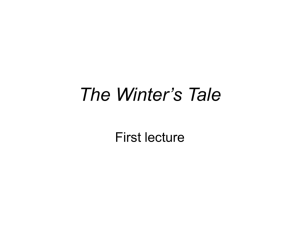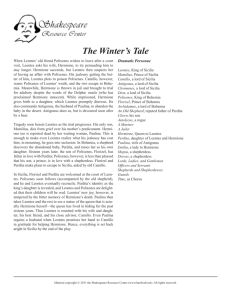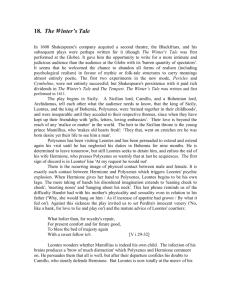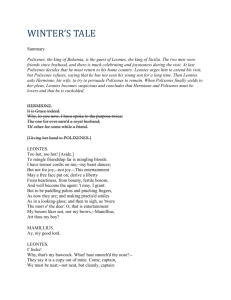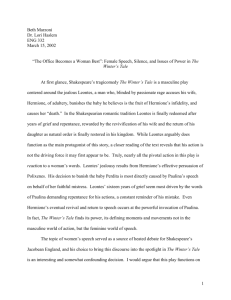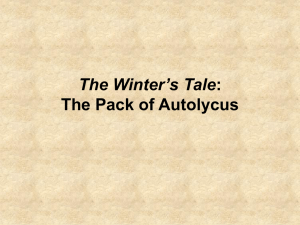Jealousy and Pride in The Winter`s Tale: The Resurrection of a
advertisement
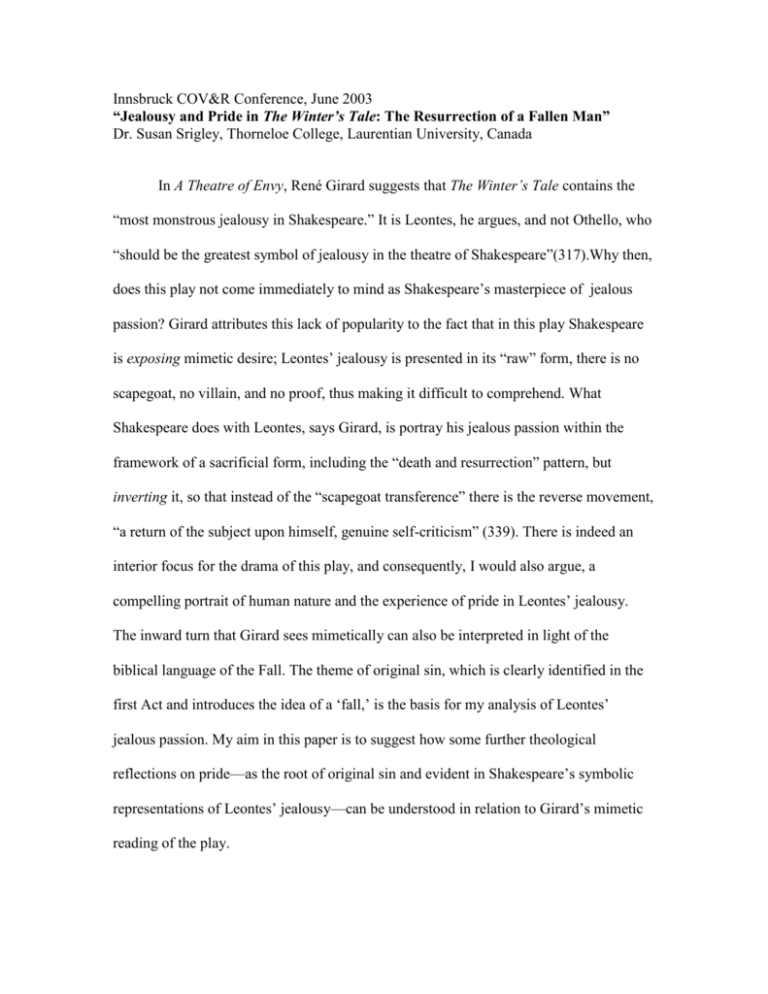
Innsbruck COV&R Conference, June 2003 “Jealousy and Pride in The Winter’s Tale: The Resurrection of a Fallen Man” Dr. Susan Srigley, Thorneloe College, Laurentian University, Canada In A Theatre of Envy, René Girard suggests that The Winter’s Tale contains the “most monstrous jealousy in Shakespeare.” It is Leontes, he argues, and not Othello, who “should be the greatest symbol of jealousy in the theatre of Shakespeare”(317).Why then, does this play not come immediately to mind as Shakespeare’s masterpiece of jealous passion? Girard attributes this lack of popularity to the fact that in this play Shakespeare is exposing mimetic desire; Leontes’ jealousy is presented in its “raw” form, there is no scapegoat, no villain, and no proof, thus making it difficult to comprehend. What Shakespeare does with Leontes, says Girard, is portray his jealous passion within the framework of a sacrificial form, including the “death and resurrection” pattern, but inverting it, so that instead of the “scapegoat transference” there is the reverse movement, “a return of the subject upon himself, genuine self-criticism” (339). There is indeed an interior focus for the drama of this play, and consequently, I would also argue, a compelling portrait of human nature and the experience of pride in Leontes’ jealousy. The inward turn that Girard sees mimetically can also be interpreted in light of the biblical language of the Fall. The theme of original sin, which is clearly identified in the first Act and introduces the idea of a ‘fall,’ is the basis for my analysis of Leontes’ jealous passion. My aim in this paper is to suggest how some further theological reflections on pride—as the root of original sin and evident in Shakespeare’s symbolic representations of Leontes’ jealousy—can be understood in relation to Girard’s mimetic reading of the play. While mimetic theory clearly enhances our reading of the Genesis story—and in fact it provides important insights for the question of why the desire for the forbidden fruit arises in the midst of plenty—there is a further question to ask about the direction of that desire: the desire to be wise like God. This desire appears to have implications both mimetic and traditionally theological. It is mimetic in the inference that human beings desire to imitate and even to rival God’s wisdom. Girard notes that “[l]ike mimetic desire, envy subordinates a desired something to the someone who enjoys a privileged relationship with it” (4). In the Genesis story, the desire, once initiated by the serpent, is to be wise like God, and so, the “someone” who enjoys a privileged relationship with wisdom, and the knowledge of good and evil, is God. God becomes the rival. Nonetheless, the Genesis story also suggests an unavoidable judgment on that desire. To be wise like God is something to which human beings wrongly aspire, insofar as they are creatures, and not God. My interest is in exploring further the theological meaning of Leontes’ desire in order to consider why the desire for God’s wisdom, and therefore the desire to be like God, is interpreted as sinful. In The Winter’s Tale, I think that Shakespeare offers an explanation: he demonstrates how Leontes’ jealousy is fuelled by pride, and the nature of this pride allows us to speculate as to what is ‘fallen’ or disordered in human beings. By contrast, the play ends with the possibility of a positive form of imitation, or a redemption from this fallen state. Act V invokes another image of God, the resurrected Christ, who, implicitly, if not obliquely, appears as the “positive” model, the model of humility. This positive model of God appears as the only remedy for Leonte’s pride, which, in effect, serves to bring him closer to an understanding of what it means to be a human being. Shakespeare introduces the idea of original sin in this play for a reason, and he does it by first presenting a mistaken view—the idea of original sin is ‘defined’ by Leontes’ friend Polixenes, who identifies Hermione as the cause of Leontes’ ‘fall.’ His account is clearly a misreading of Genesis, though not a new one: Eve, and hence women, are burdened with the responsibility for the Fall, including the implicit suggestion that this temptation has sexual connotations. What Shakespeare does is replace Polixenes’ mistaken view of original sin by offering a better interpretation of Genesis. To do so, he dramatizes a biblical reading of the Fall as it is manifested in Leontes’ jealous fit. Let us begin by considering Polixenes’ version. In describing his relationship with Leontes to Hermione, he argues not only for their absolute devotion to each other, and the sharing of all experiences, he particularly notes their innocence: “We were as twinn’d lambs that did frisk i’ th’ sun/…/what we chang’d /Was innocence for innocence: we knew not /The doctrine of ill-doing…/had we pursued that life…/With stronger blood, we should have answer’d heaven/Boldly, ‘not guilty,’ the imposition clear’d/ Hereditary ours. (I, ii, 67-75). Girard interprets this passage as indicative of the inherent mimesis in Leontes’ and Polixenes’ friendship. The echoes of Genesis in Polixenes’ account lead Girard to argue further that the Genesis story itself reveals how mimetic desire governs human choice: “the real idea of original sin is that human beings are all equally guilty of mimetic desire and scapegoating” (325). The mimetic reading of Genesis confirms for Girard Leontes’ mimetic rivalry with Polixenes, the inevitable conclusion for those who live as “twinn’d lambs.” There is only one thing wrong with Polixenes’ account, namely, the blame he lays on women for the fall, making them the scapegoats. Nonetheless, he betrays the real cause—mimetic desire—by describing his friendship with Leontes as imitative in all things. Within the play, Hermione also rejects Polixenes’ scapegoating, but her answer attempts to lead him out of his error by focusing on the question of faithfulness and loyalty: “Th’ offenses we have made you do we’ll answer/If you first sinned with us, and that with us/You did continue fault, and that slipp’d not/With any but with us” (82-84). Hermione’s real concern is not to find a culprit (scapegoat) for sin, but to confirm that the men have since been true. She will answer to any blame for which she is responsible, but in turn, can the men be responsible for their faithful relations, or will they content themselves with a perpetual transference of blame? Clearly, Hermione understands the problem of scapegoating, but her reasoning centers on the virtues of truth and fidelity, as well as personal responsibility. If women, and Hermione in particular, are as Girard suggests, Shakespeare’s “preferred vehicle of truth” (324), then her role must not be underestimated. I think the idea of women being singled out as the cause of the Fall, (whether understood historically, philosophically, or mythically) is crucial for understanding how Shakespeare reveals one particular woman as the cause of Leontes’ jealousy in The Winter’s Tale. In the first instance it is men (including Polixenes & Leontes) who are unwilling to take responsibility for their own actions, and thus accuse women of the temptation that threatens, and ultimately destroys, their innocence; in the second instance it is Leontes’ pride that makes him attribute (again, wrongly) a woman’s power of sexual temptation to her success in getting Polixenes to extend his visit. In both instances we are dealing with a form of scapegoating: trying to find a suitable culprit who has caused the disordered passions of men. But what is it that Shakespeare might see as the cause of these disordered passions, if we cannot simply blame women? In my view, all indications point to pride, to use the biblical/Augustinian language, and Shakespeare’s hint is Polixenes’ reference to original sin. Leontes’ disordered passion dramatizes an unfounded jealousy rooted in an unfounded view of women, and both rooted in prideful resistance to human limitation. Polixenes misunderstands original sin, and Leontes enacts this misunderstanding. To show this, we need to turn back to the exchange earlier in Act I, scene ii, before Polixenes raises the issue of original sin. In the opening scenes of Act I, scene ii, the discussion is whether Polixenes will stay longer in Sicilia. Leontes asks Polixenes to stay, and Polixenes repeatedly insists that he must return home. He nonetheless underscores his committed friendship, and goes so far as to say: “There is no tongue that moves, none, none i’ th’ world/So soon as yours could win me,” already emphasizing the loyal bond of love between the two friends, which he will later describe to Hermione as rooted in their innocent youth. With this oath of friendship from Polixenes, and yet his refusal to stay longer, Leontes turns to his wife for aid. Keeping in mind the image of the tongue raised by Polixenes, he asks Hermione: “Tongue-tied, our Queen? Speak you” (I, ii, 27). This marks the decisive moment, when Hermione is placed on equal footing with Leontes, her tongue now in competition with his, a tongue that Polixenes says could not be beat in convincing him to stay. Of course, this is exactly what Hermione’s tongue achieves. Her first remark to Leontes is that his approach is too cold, and she thus enlists her own female approach to keep Polixenes in Sicilia longer. But how does the idea of this sexual liason between Polixenes and Hermione come into Leontes’ mind? Hermione’s approach is not tinged with sexual innuendo. She simply tells Polixenes that all is well at home, and that if he stays she will allow her husband extra time in Bohemia on his next visit. With her successful intervention, Leontes rejoins the conversation. An important clue for interpreting Leontes’ unanticipated jealousy comes with his first words after the news that Polixenes will stay: “At my request he would not” (I, ii, 87). We should recall at this point the oath made earlier by Polixenes, that no tongue could move him to stay save Leontes’, and even Leontes could not convince him this time. Leontes’ reaction indicates quite strongly that his jealousy takes root in pride: the immediate recognition of Hermione’s success contrasted with his own failure suggests a distinct mood of being ‘outdone’ by his wife. Under these circumstances Leontes concludes—from the effects of his wounded pride and fallen condition—that there must be a sexual justification for her success. Succumbing to Polixenes’ interpretation of Genesis (and countless other interpretations in the history of the interpretation of Genesis), Leontes mollifies his pride by resorting to what Shakespeare is criticizing as the wrong reading of Genesis (which is symptomatic of pride). All that is left for Leontes to offer is his slightly condescending praise, and to this end he tells her she has never spoken better but once. Not surprisingly, the one other time she spoke well was her acceptance of Leontes’ marriage proposal, when she said “‘I am yours forever’” (I, ii, 104). The theme of fidelity, raised already by Hermione, is now reemphasized by Leontes’ claim to his wife ‘forever,’ but with a very different intention. As the play progresses, the nature of Leontes’ prideful resistance to his wife develops into something darker and more serious. More than just feeling hurt and outdone, Leontes’ interests shift to the question of his wife’s fidelity, not as a relation bound by love and trust, but as a matter of control. His pride surges disproportionately when he realizes that he cannot control his wife’s fidelity in the same way he controls other things. With careful attention to how Leontes’ speaks after he has decided upon his wife’s guilt, the nature of his pride becomes clearer; it is not simply a matter of wounded self-esteem, but the deeper experience of, and resistance to, human limitation. What Hermione does, by speaking better than Leontes, is initiate his prideful resistance to her; his jealous response is the desire to control further woundings. Leontes’ reminder to Hermione that she has claimed to be his forever is a desperate effort on his part to insist on the control he hopes to maintain, revealing his dissatisfaction with the uncertainties of trust and human love. As King, the fidelity of Leontes’ wife is both a personal and political issue. It is no coincidence that his first question to his son is: “Art thou my boy?” (I, ii, 118). To trust in love ‘forever’ is to lose control of one’s political concerns, heirs, and personal reputation. Leontes’ pride, his desire for control and his unwillingness to live within the limitations of human life and knowledge, all lead him to accuse Hermione of a fault which he himself has created. Leontes’ justifications to himself and others demonstrate even more forcibly that Shakespeare is using the themes of original sin and fidelity to make sense of his jealousy. His insistence on control and his desire for absolute knowledge can be observed in several instances within the play. I will highlight just one: his obsession with his son’s paternity. One of the most revealing lines of the play, which reinforces my point about Leontes’ political concerns being tied to his wife’s fidelity, comes in the first throes of jealous passion. While speaking to his son Mamillius in vulgar ways, with explicit allusions to his mother’s questionable virtue, he repeatedly attempts to confirm his position as Mamillius’ father. He concludes with frustration over the trust required in relations of love, which threaten to leave his kingdom in peril. Leontes’ despairs that politics and love do not mix well, since trust implies that his kingdom is dependent upon the virtue of his wife’s sexual conduct: “No barricado for a belly. Know’t /It will let in and out the enemy,/With bag and baggage” (I, ii, 204-5). This final statement, the fact that Leontes cannot somehow control his wife’s virtue, is reduced to the basest sexual and political terms. Hermione becomes a belly, a vehicle through which she can betray Leontes politically, by affecting his heirship, letting the enemy “in” as it were. His suspicions, and hence his attempt to control her sexually is justified by political reasons. However, Leontes’ aspirations, as I have suggested, are not limited to political concerns. His attempt to know like God knows is given its most explicit form with his rejection of Apollo’s oracle: Leontes rejects the truth of the oracle in favour of his own opinion (III, ii, 136-7). He only recants in the face of death: his son’s, and the apparent death of his wife, which immediately and naturally curb Leontes’ pride. If pride fosters the refusal to acknowledge human limitation, death comes as a stark reminder. Leontes hesitates, confesses his shame to Paulina, accepts the guilt for his wife and sons’ deaths, and offers to visit the chapel daily where the meditation on his responsibility “shall be [his] recreation (or, re-creation)” (III, ii, 236). This practice is his education in humility until the final resurrection scene in Act V. Girard argues convincingly that the explicitly religious language of resurrection is integral to the meaning of the final Act. Despite the resistance on the part of scholars who argue that there is no ‘real’ or ‘actual’ resurrection, nor is the language religious (336) Girard contends that this religious dimension in the final scenes is undeniable. He suggests that “the character who dies in Act 2 and resurrects in Act 5 is not Hermione but Leontes…”(336). I would agree that the resurrection scene has everything to do with the ‘fallen’ man Leontes, since the religious theme of resurrection is consistent with the language of original sin in Act I. Stated more precisely, the character who falls (note: neither Leontes nor Hermione die, but they both ‘fall’) in Act 2, and resurrects in Act 5 is Leontes. The resurrection scene completes Shakespeare’s presentation of the meaning of Leontes’ fall, and it also concludes his refutation of Polixenes’ misreading of Genesis and original sin. The resurrection scene is crucial for interpreting the question raised earlier: what is “wrong” with the human desire to be wise like God? What is it about the desire for divine wisdom that tempts human beings to exceed the limitations of their knowledge, especially in matters of justice? By identifying this fallen desire as pride, Shakespeare expresses that this imitation of God is harmful because it rivals God for something that is ultimately beyond human reach. Death is not the end of Leontes’ fall on account of two things: One, as stated by Girard, is “the certainty of being forgiven” (342), as Hermione is returned to him alive; the other is the revelation of a better model of imitation. Girard’s description of Jesus in I See Satan Fall Like Lightning, addresses this kind of humble imitation: “His goal is to become the perfect image of God…In inviting us to imitate him, he invites us to imitate his own imitation” ( Satan, 13). This kind of humility is an expression of the imitation of God that is not self-serving. It is an imitation markedly different from prideful self-assertion, which, rather than opening the self to the service of others, mistrusts in the service of protecting the self and its own interests. The Winter’s Tale offers a compelling portrait of a man whose pride leads him to a monstrous display of jealous passion, and yet by situating this drama within the themes of original sin and resurrection, Shakespeare provides the framework for a theological interpretation of Leontes’ fall and redemption. The passions are understood in relation to a theological measure. By way of conclusion, I would like to suggest briefly what I perceive is at stake between my theological interpretation of the play and Girard’s mimetic reading. While the two readings are clearly not discordant, my theological interpretation of Leontes’ pride makes a different claim about the text, that is, I am interpreting Shakespeare in light of a philosophical anthropology. How does Shakespeare understand human nature? What disorders human loves and passions, and what orders them? In his analyses of Shakespeare, Girard does not engage in such direct statements about human nature beyond its mimetic propensities. He argues instead that the point of reading Shakespeare is not to discover his view of human nature, but rather to observe his representation of the conflict of desire: “the main problem is not whether such phenomena as intrinsic selfcenteredness or permanent character really exist…their existence is irrelevant to a playwright interested in dramatic effects. He is not writing philosophical or psychological treatises, but comedies and tragedies of desire” (96). In this paper, my emphasis has been to look more closely at these realities of human nature, although mindful of mimetic theory and its meaning in relation to theology. My interpretation suggests that Shakespeare’s dramas, insofar as they are comedies and tragedies of desire, unavoidably convey his philosophical understanding of human beings and human nature.
